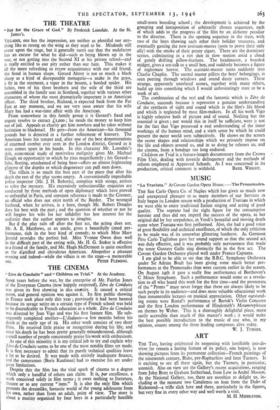THE THEATRE
But for the Grace of God." By Frederick Lonsdale. At the St. James's.
Vuituns, one has the impression, are neither as plentiful nor any- thing like as strong on the wing as they used to be. Misdeeds still occur upon the stage, but it generally turns out that the malefactor has an excuse for what he did—such as being blown up in the war, or not getting into the Second XI at his private school—and is really entitled to our pity rather than our hate. This makes it all the more refreshing to renew acquaintance with our old friend, the fiend in human shape. Gerard Altrey is not so much a black sheep as a kind of disreputable menagerie—a snake in the grass, a fly in the ointment, a viper in the bosom, a bottled spider. His father, two of his three brothers and the wife of the third are assembled in the family seat in Scotland, together with various other characters of whom the most dramatically important is an American officer. The third brother, Richard, is expected back from the Far East at any moment, and we are very soon aware that his wife Mary has had a war-time affair with the American.
From somewhere in this family group it is Gerard's fixed and urgent resolve to extract £I,000 ; he needs the money to keep him out of jail. Appeals to charity get him nowhere and he takes without hesitation to blackmail. He gets—from the American—his thousand pounds but is detected in a further refinement- of knavery. The American loses his temper and, after one of the best demonstrations of unarmed combat ever seen in the 'London district, Gerard as it were comes apart in his hands. In this character Mr. Lonsdale's deft, economical study of motiveless malignity gives Mr. Michael Gough an opportunity to which he rises magnificently ' • his Gerard— false, fleeting, unashamed of being base—offers an almost frightening glimpse of the depths to which degeneracy can pull men down.
The villain is so much the best part of the piece that after his death the rest of the play seems empty. A conventionally improbable police inspector (Mr. J. H. Roberts), complete with stooge, arrives to solve the mystery. His excessively unbusinesslike enquiries are conducted by those methods of open diplomacy which have proved so unfruitful in Paris, and constant reference is made to the Coroner, an official who does not exist north of the Border. The wronged husband, when he arrives, is a bore, though Mr. Robert Douglas does his best with the part ; and the question of whether or not he will forgive his wife for her infidelity has less interest for the audienCe than the author appears to imagine.
But if the play tails off after the first act, the acting does not. Mr. A. E. Matthews, as an uncle, gives a beautifully timed per- formance, rich in the best kind of comedy, to which Miss Mary Jerrold provides the perfect foil. Miss Yvonne Owen does well in the difficult part of the erring wife, Mr. H. G. Stoker is effective as a friend of the family, and Mr. Hugh McDermott is quite excellent as the dignified and chivalrous American. Altogether a pleasant evening and indeed—while the villain is on the stage—a memorable


























 Previous page
Previous page